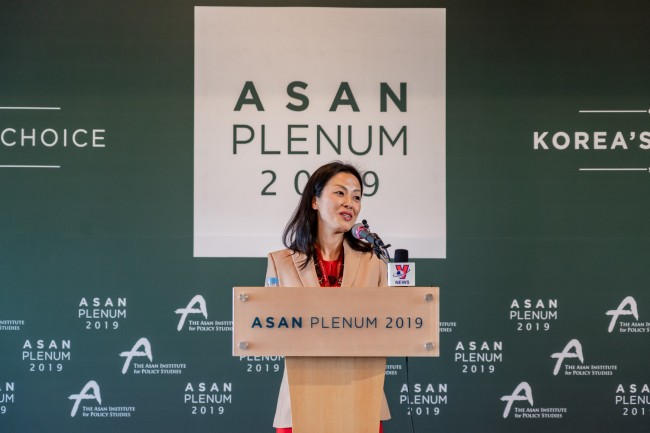As North Korean leader Kim Jong-un arrived in Russia on Wednesday for his first summit with Russian President Vladimir Putin, an expert on North Korea said the meeting would not be a “game changer.”
Pak Jung, a senior fellow and the SK-Korea Foundation Chair in Korea Studies at the Brookings Institution, also said the second summit between Kim and US President Donald Trump was not a failure, but an opportunity for related parties to understand the limits to what each has been pursuing. Pak was a leading North Korea analyst with the Central Intelligence Agency for nine years.

Pak Jung (Asan Institute for Policy Studies)
“We learned that Kim is not interested in a peace treaty for its sake or security guarantees. He is very adamant about getting sanctions relief,” Pak said in a press conference held as part of the 2019 Asan Plenum.
As the North Korean leader is set to hold his first summit with Putin on Thursday, Pak said it is Kim seeking to obtain Russia’s support, but stressed that this would not bring sweeping changes.
“I see Kim’s visiting Russia this week as a continuation of what he has been doing over the past year, to use bilateral relationships and summits to create division among the regional partners and with the US,” Pak said, adding that Russia does not have much to give to North Korea.
“There is very little in the Kim-Putin relations other than the symbolic meeting, and I do not think it is going to reverberate or cause an alarm on Trump administration about what is going on there.”
On the US-North Korea summit in Hanoi, Vietnam, in late February, Pak said it showed Kim is not interested in improving inter-Korean ties, and that the conciliatory approach of South Korean President Moon Jae-in also has its limits.
“North Korea only continues to criticize the Moon administration for its alliance with the US and for not being able to act independently,” she said.
As for Kim, he learned that despite the love letters and friendship that he seemingly established with Trump, everyone is on the same page on the issue of denuclearization and keeping sanctions in place.
“Trump was inconsistent in a lot of things, but one talking point that he has been utterly consistent on was that no sanctions will be lifted without denuclearization.”
Pak stressed that working-level discussions should come before the third summit, as the Hanoi summit taught them that the so-called “top-down” approach to negotiation does not work.
In an essay titled “The Education of Kim Jong-un,” Pak also explained that Kim’s attitude is more cautious on the economy, while he is much more comfortable with military issues.
“He was very aggressive about weapons, and he did not care who he was making angry (in pushing with his plans),” Pak said. “On the economy front, for one, he just does not know how the economy works. There is very little or new interesting idea he says on the economy.”
Watching his father fail to achieve currency reform in 2009 could also have had an influence and may have limited Kim’s pursuit of big economic policies.
“There was a big backlash against that policy (currency reform) and it was quickly reversed. And I can imagine where a young Kim, as he was learning from his father, how making such big economic moves have the potential to really hurt him in the process.”
While Kim has been very brutal with his military officials and generals -- demoting them and even purging them -- there has been much more consistency for economic officials, she added.
By Jo He-rim (herim@heraldcorp.com)






![[KH Explains] How should Korea adjust its trade defenses against Chinese EVs?](http://res.heraldm.com/phpwas/restmb_idxmake.php?idx=645&simg=/content/image/2024/04/15/20240415050562_0.jpg&u=20240415144419)